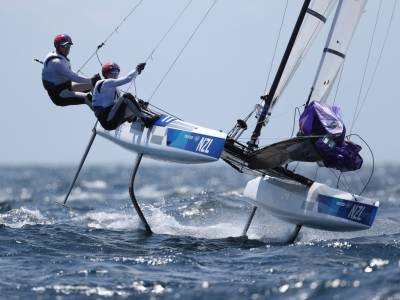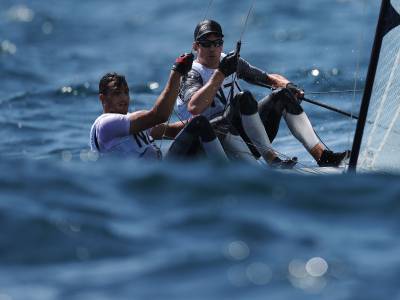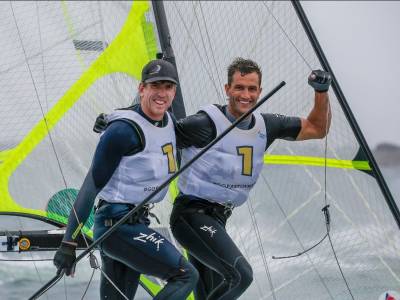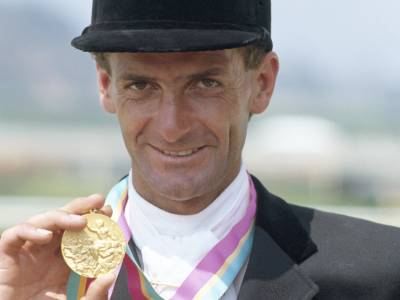By Joseph Romanos
Peter Burling and Blair Tuke followed in some celebrated footsteps when they were named as the 2016 New Zealand Olympic team co-captains.
They will lead the New Zealand team into Rio de Janeiro’s Maracana Stadium for the opening ceremony, with Burling, a three-time Olympian, the designated official flag-bearer. As team captains, they will also fill a leadership and mentoring role for other New Zealand athletes throughout the games.
The pair are celebrated yachties – four times world champions and Olympic silver medallists in London in 2012 – so will be focused on claiming the gold medal in the 49er section of the sailing.
The bookies make them overwhelming favourites, but in the ever-changing world of international sailing, nothing can be taken for granted.
Nevertheless, to judge from their reaction to being named co-captains – the first time the New Zealand Olympic team has had such an arrangement – Burling and Tuke are keen to take on a wider leadership role in Rio.
The naming of the New Zealand team captain has become increasingly important – in the media, and within the team itself – in recent years.
Since 1984, such luminaries as John Walker, Ian Ferguson, Mark Todd, Barbara Kendall, Blyth Tait, Beatrice Faumuina, Mahe Drysdale and Nick Willis have carried the flag as team captain.
Previously, the choice of captain was made for less clear reasons.
The Australians were uncharacteristically generous in 1908 and 1912, when New Zealand competed under the banner of Australasia. New Zealand walker Henry Murray (1908) and swimmer Malcolm Champion (1912) were given the honour of carrying the team flag in those opening ceremonies, even though Australians made up the bulk of the teams.
Sometimes big names were chosen, as in 1924 and 1928 with sprinter Arthur Porritt and 1936 with middle-distance star Jack Lovelock.
New Zealand also had a hankering, it seems, to be led by big men – shot putter Les Mills in 1960, and heavyweight weightlifters Harold Cleghorn in 1952 and Don Oliver in 1968.
All three were popular and respected team members, but perhaps none carried the flag with quite the memorable technique of Russian super heavyweight weightlifter Leonid Zhabotinsky at Mexico City in 1968. He carried his team flag throughout the ceremony with just one hand, a considerable show of strength because the flag in those days was extremely heavy. Zhabotinsky’s effort might have had some positive psychological spin-offs for him – he went on to convincingly retain his Olympic title the following week.
New Zealand dabbled with wrestling in the 1970s – Dave Aspin carried the flag in both 1972 and 1976, joining Porritt as the only people to have had the honour at an Olympics twice.
In 1980, New Zealand team manager Tay Wilson had a limited choice of candidates. The American-led boycott left New Zealand with just four competitors, three canoeists and modern pentathlete Brian Newth, who was Wilson’s choice.
Whereas for many decades athletes arrived before the games and stayed until the end, these days many choose to arrive at the Olympic city only a few days before their competition, which might be 10 or 12 days after the games begin. That obviously disqualifies them from leading the opening ceremony march. Other athletes – quite often rowers and swimmers, for example – compete the day after the opening ceremony and therefore elect to bypass the ceremony, which can be strength-sapping. This is even more the case these days because the ceremony is held in the evening – the last opening ceremony held during the afternoon was in Seoul in 1988.
Happily, New Zealand has compiled such a fine record at recent Olympic Games that the team chef de mission, now Rob Waddell, has never been too stretched to find a fitting captain.
That’s certainly the case this year. Burling and Tuke, who are also key members of the Team New Zealand America’s Cup lineup, are huge figures in the world of sailing and are clearly much respected by their team-mates in Rio.
Rio 2016 Olympic Summer Games Blair Tuke Peter Burling Mahe Drysdale Nick Willis Mark ToddTweet Share



